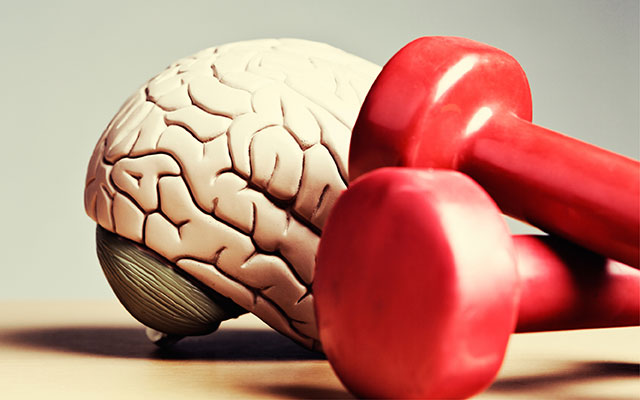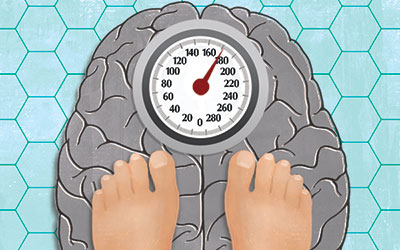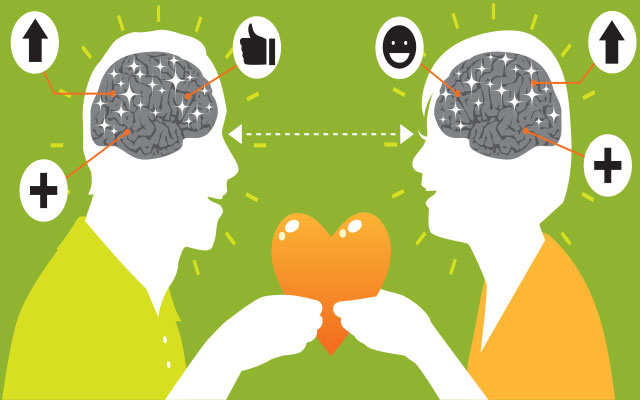On a recent trip to the supermarket, as I stood face-to-face with the cashier who’d just rung up my cartful of groceries, I realized I didn’t have my wallet. I felt foolish and absent-minded — though I know I’m hardly alone in my occasional forgetfulness.
At one time or another, we all lose track of keys and cell phones (and wallets) or have those tip-of-the-tongue instances when a name escapes us.
Even when they are only mildly frustrating, these momentary memory lapses can also trigger genuine fear: Could they be signaling the onset of dementia or Alzheimer’s?
After all, research has shown that the hippocampus, the area of the brain that builds memory, shrinks as we get older.
But the truth is, we all forget things from time to time — and memory loss is not inevitable as we age. In recent years, neuroscientists have discovered that the brain can remain much more robust over time than they once thought.
In fact, whenever we form a new memory, we generate new neural networks that keep our brains functioning at a high level — a phenomenon known as neuroplasticity.
Combining that process with some basic healthy-living strategies can help protect — and even repair — our memory at any age.
Mind Over Matter
Like the rest of our bodies, our brains thrive on a nourishing, low-glycemic diet, regular exercise, plenty of sleep, and low stress levels, says Gary Small, MD, director of the Longevity Center at the University of California, Los Angeles and coauthor of 2 Weeks to a Younger Brain. And the more healthy activities we practice, the less likely we are to encounter memory problems.
In 2013, Small’s research team surveyed more than 18,500 people nationwide and found that those who regularly practiced at least three healthy behaviors — things like eating fresh vegetables and working out, for instance — were 75 percent less likely than their unhealthy counterparts to report memory-loss symptoms.
“The lifestyle choices we make can keep the brain from shrinking and our neural networks working well,” says Small.
Here are the basic healthy-living behaviors that are most likely to improve our memory now and sustain it well into the future:
1) Eat smart.
Eating fresh produce has been shown to lower the risk of developing Alzheimer’s and related forms of dementia, Small notes. He endorses a Mediterranean-style diet, featuring fresh produce, whole grains, nuts, fish, and healthy fats like olive oil. He is particularly keen on anti-inflammatory foods, especially those rich in omega-3 fatty acids like wild-caught salmon, scallops, kidney beans, and walnuts. Avoiding added sugars and refined carbs is another brain-sparing, anti-inflammatory move (for more on that, see “Food Habits That Age You“).
2) Move your body.
Exercising bathes the brain in nutrients and oxygen. It also produces a protein called brain-derived neurotrophic factor (BDNF), which repairs damaged brain cells and stimulates healthy regrowth, improving neural communication.
A 2013 study found that older research subjects with elevated levels of BDNF had about half the likelihood of developing dementia during the ensuing 10 years compared with those with lower levels of the protein.
Any exercise is better than no exercise. A study published last year in the British Journal of Sports Medicine found that women who participated in a twice-weekly outdoor walking program showed an increase in hippocampal volume. (For our functional-aging workout, visit “All-Ages Strength Training“.)
3) Socialize more often.
Having a social conversation is a complex mental task: We must listen, remember what the other person has said, think of what we want to say next, and pay attention to nonverbal and emotional cues. Talking is such an effective brain-booster that one study at the University of Michigan saw improved working memory among subjects who engaged in a single 10-minute conversation.
4) Learn something new.
A 2011 Swedish study found that adults who intensely studied a foreign language showed improved memory for people’s names.
Taking up any new activity that is practiced diligently, such as guitar playing, knitting, or golfing, can also generate fresh neurons. “You form new connections between brain cells whenever you learn something new,” says Zaldy S. Tan, MD, medical director of the Alzheimer’s and Dementia Care Program at the University of California, Los Angeles. This is also true if we stretch ourselves in a skill we already know — like learning a new or more challenging piano piece.
(See “Build a Healthier Brain by Building Expertise” for more.)
5) Get plenty of sleep.
Our need for sleep doesn’t decline with age, according to the National Sleep Foundation. In addition to impeding tissue repair, a lack of sleep impairs concentration, learning, and memory; regularly getting six hours of shuteye or less has been shown to erode working-memory performance.
“It’s while we are sleeping that memory gets laid down and rehearsed and consolidated,” said Gayatri Devi, MD, FACP, FAAN, director of the New York Memory and Healthy Aging Services.
(Quality sleep may help prevent Alzheimer’s. See “The Sleep-Memory Connection” for more.)
6) Play some games.
Brain-boosting puzzles like sudoku and crosswords help stimulate the brain’s synaptic networks, says Small. And online brain-training tools like Lumosity seem to improve attention and short-term memory. While they’re valuable for keeping us sharp on a day-to-day basis, “it’s a myth that playing brain games will prevent Alzheimer’s,” he says.
Forget About It
Amid attempts to boost our memory, it’s important to not stress out when our powers of recollection falter. As Devi notes, forgetting is actually a vital aspect of memory.
“Forgetting allows us to prune our memory bank so what we think is relevant is retained,” she says. “And it clears the way for new memories. Without forgetting, we wouldn’t be able to learn.”
The Way We Forget
The memory process has three stages: encoding, storage, and retrieval. When we encode a memory, the hippocampus creates a snapshot of the sensory information and files it away. When a memory is encoded and stored correctly, it is readily retrievable.
“When one or more of these processes does not occur properly, you get forgetfulness,” says Zaldy S. Tan, MD, medical director of the Alzheimer’s and Dementia Care Program at the University of California, Los Angeles.
To better understand memory lapses, Daniel L. Schacter, PhD, a psychology professor at Harvard University, has identified three types of forgetting:
- Absent-mindedness results from a disconnect between attention and memory. This leads to blanking on where the keys are. “That happens because I focused on something else when I put that object down,” Schacter says. “It’s almost a complete absence of encoding.”
- Blocking occurs when we’ve encoded the information but our brains can’t retrieve it. This is the tip-of-the-tongue state. It usually affects our recollection of information that we are familiar with but haven’t accessed recently or frequently.
- Transience, or the fading of memories over time, happens to everyone at pretty much every age.
While experiencing any of these hindrances might scare us about our susceptibility to dementia or Alzheimer’s, it typically is not a predictor of cognitive diseases later in life.
This article originally appeared as “Beyond Sudoku” in the November 2021 issue of Experience Life.




This Post Has 0 Comments